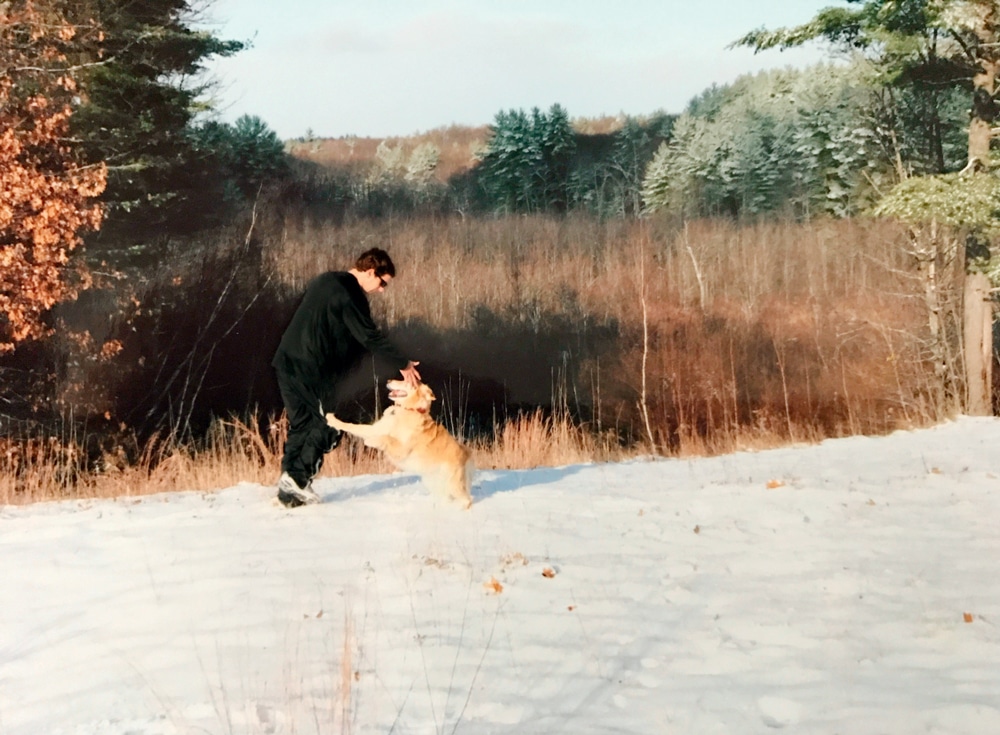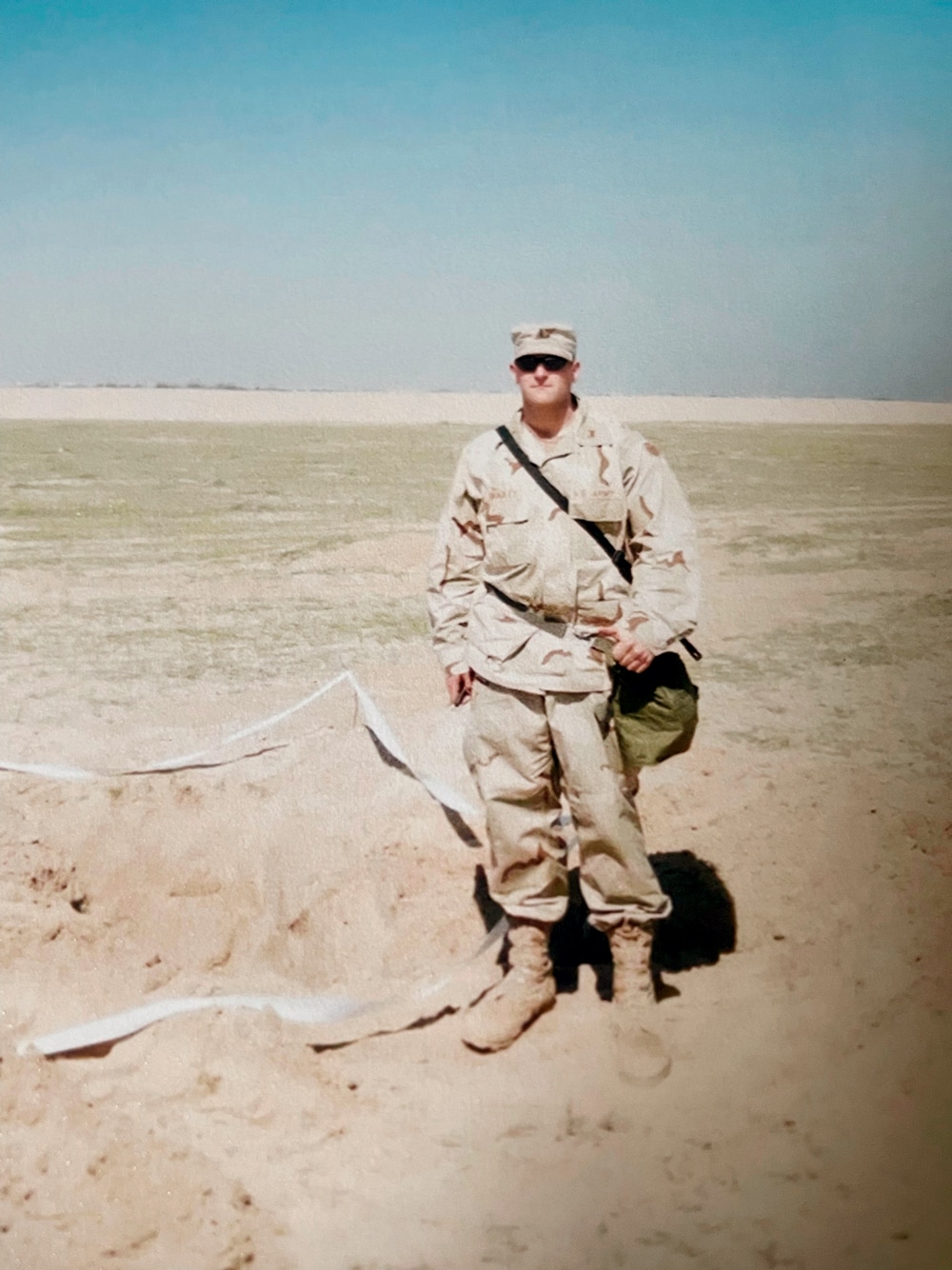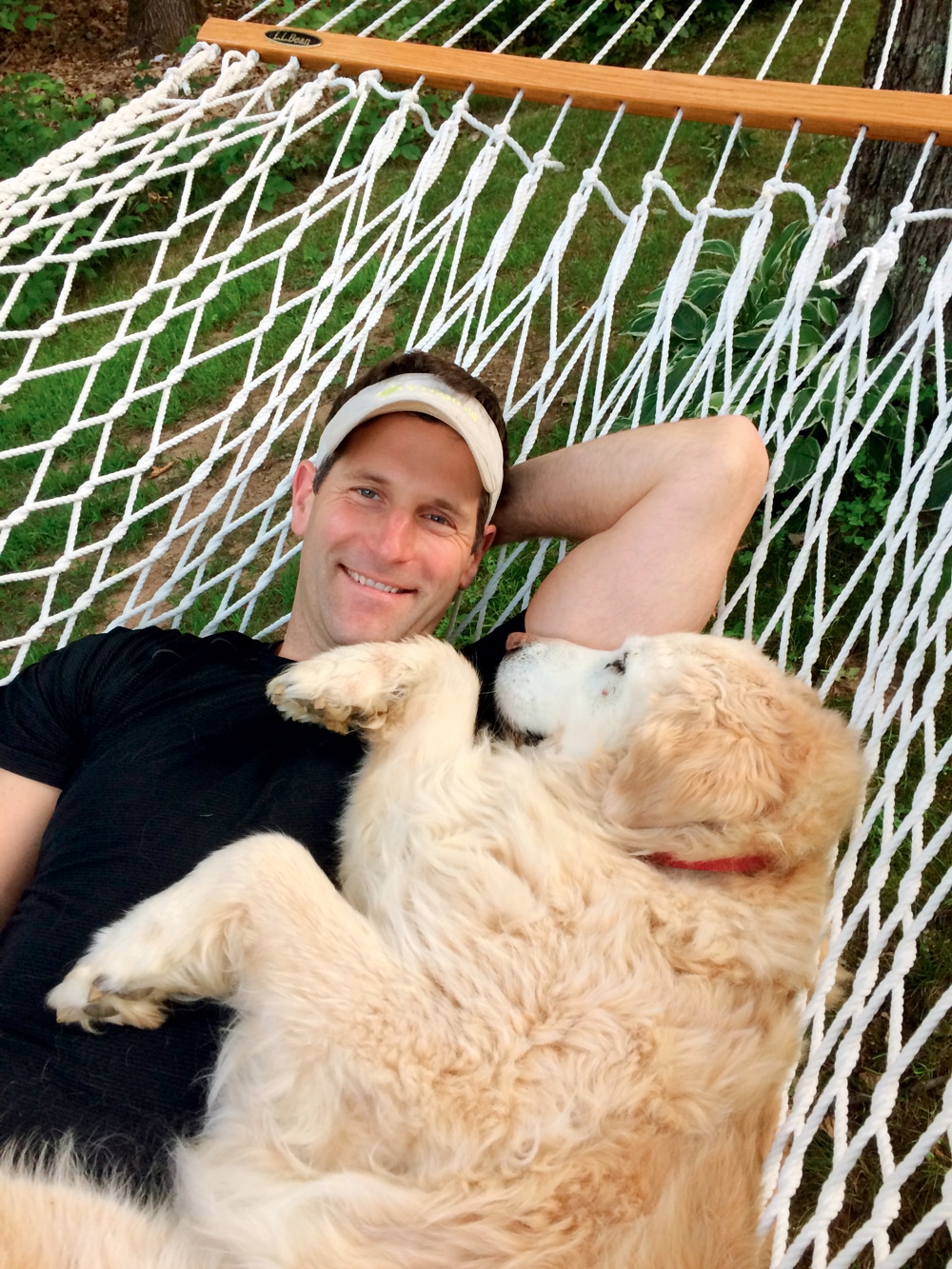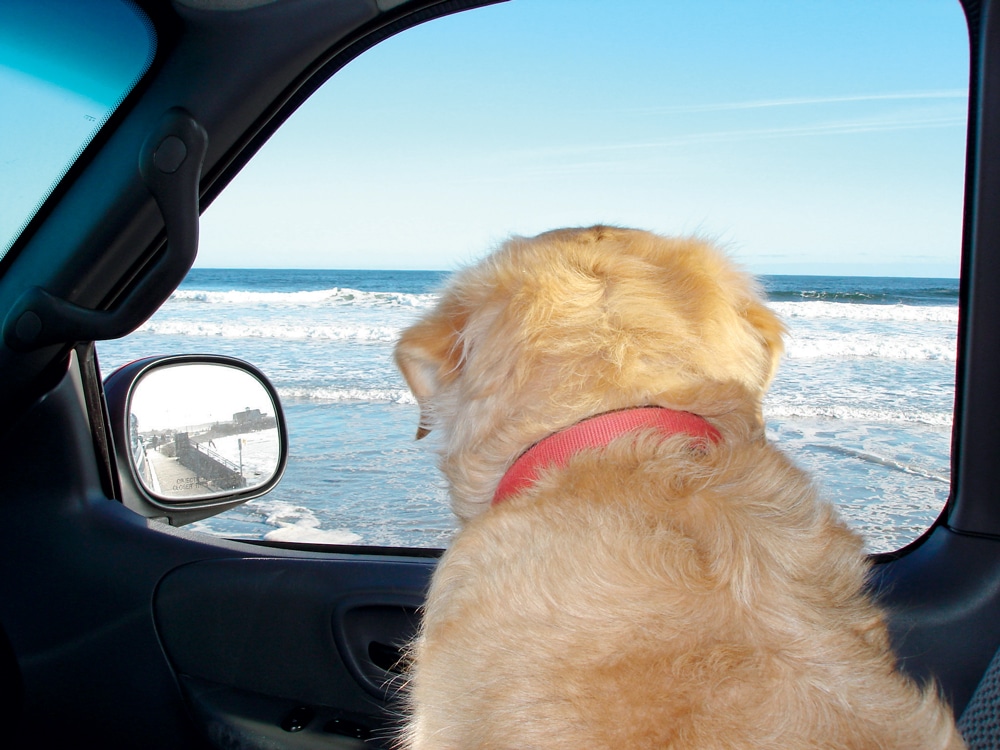The Rescuers
Posted by admin on
When my future husband returned from Operation Iraqi Freedom, he set out to get a “guard dog” because hunters had trespassed on his land. It was 2003. Jeff was a 25-year-old West Point graduate with a jawline of edges. I did not know him yet, but in pictures his brown hair is tightly clipped. His shoulders are puffed up from the weights he pressed overseas to distract himself from the sandstorms and the constant threat of enemy fire.
The way the story goes, Jeff went to a kill shelter outside Fort Leonard Wood, Missouri. “I need a guard dog,” he told the shelter manager. A dozen dogs barked and lunged at the chain link gate. Jeff pointed to a silent pup whose eyes were as sunken as the spaces between his ribs. “That one, in the corner.”
“You sure?” the manager asked. “Bad case of worms.”
Jeff locked eyes with the golden mix. “I’ll take him.” He handed over 15 dollars cash.
The dog, Rollie, barreled straight for Jeff’s red pickup truck. With the grace—or fear—of a gazelle, he leapt onto the front seat. His swiftness appealed to Jeff, who, like most veterans, had come home with reasons to run.
And run they did. Rollie, who looked like a golden retriever but was built like a Lab, gained strength as they ran. Over Missouri hills and, later, wooded New Hampshire trails, and for more than a decade, Jeff and Rollie ran together daily, their brotherhood as strong as their legs.

Before or after going on a run together, Jeff and Rollie would often have a playful sparring session in their New Hampshire backyard, as in this 2005 photo, taken six months after Jeff got out of the Army.
Courtesy of Emily Bradley
By the time I met Rollie, he and Jeff had run more than 1,000 miles. It was 2005. Jeff had been discharged from the Army, and I was in my last year of college, naïve to the emotional impact of combat. It was a Friday night. Behind a glass door, a flash of fur ran circles around his tail like a child’s windup toy.
“He likes you,” Jeff said.
When Rollie stopped spinning, I could see that he had eyes the color of hickory, a coat as thick as wool and as blond as my own hair, and the very non-guard-dog look of a Christmas-card pup. He picked up a stuffed hedgehog toy and cocked his head to the side, cautious but inquisitive. It was clear that Jeff had chosen a companion, not a protector.

Jeff, then an Army first lieutenant, in the Kuwaiti desert before the 2003 invasion of Iraq.
Courtesy of Emily Bradley
Jeff reached for the doorknob. “Be careful when you leave—he’ll push right past you. He hates being left behind.”
Being left behind was, indeed, Rollie’s primary preoccupation. When he sensed exiting, he positioned himself on the doormat, lying in wait. Once before leaving for a dinner party, I forgot to block Rollie. He flew between my gold heels and darted into the backyard. “Damn it!”
“Don’t yell,” Jeff said. “He’ll think you’re mad at him.”
I flopped onto the couch, annoyed, because I knew Jeff would wait for Rollie to come back before we left. An hour later, after we’d missed the entrée, Rollie bounced over the stone wall with foul-smelling black tar across his back. He’d rolled in dead possum.
I rolled my eyes.
Jeff rolled up his sleeves and turned on the hose. “Never leave a soldier behind.”
For years, I was jealous of Rollie—that Jeff never got mad at him, that his vet appointments made the calendar when date nights did not, that the pitter-patter of his toenails could instantly lighten Jeff’s mood. Mostly, that they comforted each other in a way I could not.
When Rollie ran in his sleep—paws scratching at our farmhouse wall, voice whimpering—Jeff would bend down, scratch his ear, and whisper, “Hey guy, it’s OK.” Rollie would start awake, eyes wide, then roll over, and sigh deeply.
When Jeff startled from a dream of Nasiriyah—forehead sweating, forearms tensed—he would scoop Rollie up, carry him to the maroon recliner, and splay all 60 pounds of sleeping dog across his chest. Their breath synced. They were as their bodies insisted: yin and yang, stray and soldier, rescued and rescuer.
The psychological term for this phenomenon is co-regulation—the process by which two beings regulate their nervous systems together, often resulting in calm. I knew Jeff and Rollie needed each other, but on the nights when they slept bellies-up in the chair, at ease, I didn’t fully comprehend the therapeutic value. I just lay alone in bed feeling shut out and helpless, wondering who rescued who.
When Rollie was 8, after Jeff and I had been married for three years, he tore a ligament in his left knee on a run. He hobbled up the driveway, stoically ignoring his injury. But the limp was severe. Jeff whisked him into the red truck and drove directly to the emergency vet. Rollie came home with shaved hindquarters, anti-inflammatory medication, and rehab orders.
Jeff’s pace had slowed at that point, too—he was 35—but his dedication to their ritual had not. In the time they would normally run, Jeff wrote and published the children’s book Running with Rollie. In it, a soldier and his dog run and run and run.
“Is it autobiographical?” the local children’s librarian asked Jeff after he read the picture book at story time. Fifteen preschoolers made a horseshoe around him. He looked at me nervously.
“Not exactly.” Jeff patted Rollie, whose leg had healed enough to jog. “It’s inspired by true events.” He talked about how hard it was to watch soldiers return home to an empty house, but he did not mention veteran suicide rates or the invisible wounds from which both he and Rollie ran. He just hung on to Rollie’s leash.
Later that afternoon, I found Jeff asleep on the hammock. Rollie covered him like a blanket. As they swayed in the breeze, I began to understand the necessity of their bond—that Jeff meant safety to Rollie, and Rollie made something safe in Jeff that I would never fully access. I still envied their closeness, but I was also grateful for how each so clearly served the other, and me. Jeff planned the run routes, but Rollie was the trailblazer, the one who opened the closed-off territory of Jeff’s heart. One mile, one tongue-heavy breath at a time, he made Jeff secure enough to trust and love, again.
And he gave me a map.

The two running buddies at rest during the summer of 2016, in between Rollie’s cancer treatments. this page.
Courtesy of Emily Bradley
One morning, as Jeff adjusted Rollie’s collar for a slow jog, Rollie did not leap for the door. He laid his head on the linoleum floor and looked away.
“No run today, guy?” Jeff asked, concerned. Rollie whimpered. Drool pooled on the floor. Out of his left jawbone, a lump the size of a grape had grown.
“Metastatic melanoma,” the vet said the next day. Rollie was 13. The vet outlined the options: We could pursue chemo, or a new protocol, but Rollie was old and the side effects could be worse than the cancer.
“We have to try,” Jeff said. There was something so primal in his tone that, even though I considered the course futile, I agreed. He could not control the deaths overseas, but he could control this one. And Jeff, I knew, hated being left behind.

Rollie looks out at the ocean in York, Maine, in a moment from his many truck rides with Jeff.
Courtesy of Emily Bradley
The treatment worked for a few months. During this time, Jeff walked a wooden-legged Rollie down the plastic stair ramp, just past the mailbox, and back again.
“It’s OK, guy,” Jeff said when Rollie’s legs started to buckle under him. Rollie turned his head away, seemingly embarrassed by his immobility. One by one, Jeff placed Rollie’s paws in front of each other to give him the dignity of walking. But it was not long before Jeff had to carry him out to pee.
When Rollie’s legs were too spindly to stand and he stopped drinking water, Jeff arranged for the vet to come to our house. He smoothed the Army poncho liners that lined the white carpet of our bedroom, turned on a fan, and grabbed a stuffed hedgehog. He lay belly-down on the floor next to Rollie, recalling the early miles they logged—under the St. Louis arch, around creeks, through marshes. He whispered about the time a bone-thin, brand-new-to-Jeff Rollie had sprinted across Route 66 and how, through three lanes of traffic and up a mountain, Jeff had run after him.
I paced outside the bedroom, peering in occasionally but never interrupting. Inside, Jeff cradled Rollie’s long, white muzzle in his lap. They sat still. Side by side, they did not try to outrun grief.
Later that day, Jeff took off Rollie’s dog tags.
Jeff gave Rollie a proper soldier’s burial. It was a clear July day. Under a banner of blue sky, the grass of the pet cemetery was shorn close, like Arlington’s. A tent shaded the grave. Jeff wore his black sneakers and held Running with Rollie.
From a tiny Bible he had carried in his breast pocket through Iraq, Jeff read scripture. Taps played in the background. I squeezed Jeff’s hand and did what Rollie had done: held space for someone else’s pain.
The bugles sounded. Jeff covered Rollie’s urn with an Army bandana, lowered it into the earth, and shoveled soft layers of dirt on top. A tear welled in Jeff’s eye and his breath quickened. Rollie would have nuzzled his knee, so I knelt beside Jeff. I was flooded with gratitude that Rollie had given me a blueprint for how to comfort Jeff.
Rollie’s headstone glinted in the sun. Two paw prints were etched in the granite as though he had sprinted right across it. And just below the tracks, in the center of the stone, was the epigraph Jeff chose to honor Rollie’s life: Born to run.
But I know now, years later, that the phrase told only half of the story. While Rollie certainly was born to run, his legacy was just the opposite. In the end, he taught us all how to stay.
The post The Rescuers appeared first on New England Today.
